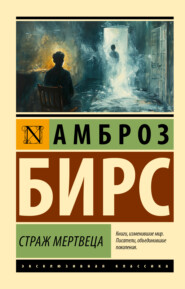По всем вопросам обращайтесь на: info@litportal.ru
(©) 2003-2024.
✖
The Letters of Ambrose Bierce, With a Memoir by George Sterling
Настройки чтения
Размер шрифта
Высота строк
Поля
This is just a hasty note to acknowledge receipt of your letter and the poems. I hope to reach those pretty soon and give them the attention which I am sure they will prove to merit – which I cannot do now. By the way, I wonder why most of you youngsters so persistently tackle the sonnet. For the same reason, I suppose, that a fellow always wants to make his first appearance on the stage in the rôle of "Hamlet." It is just the holy cheek of you.
Yes, Leigh prospers fairly well, and I – well, I don't know if it is prosperity; it is a pretty good time.
I suppose I shall have to write to that old scoundrel Grizzly,[1 - Albert Bierce.] to give him my new address, though I supposed he had it; and the old one would do, anyhow. Now that his cub has returned he probably doesn't care for the other plantigrades of his kind.
Thank you for telling me so much about some of our companions and companionesses of the long ago. I fear that not all my heart was in my baggage when I came over here. There's a bit of it, for example, out there by that little lake in the hills.
So I may have a photograph of one of your pretty sisters. Why, of course I want it – I want the entire five of them; their pictures, I mean. If you had been a nice fellow you would have let me know them long ago. And how about that other pretty girl, your infinitely better half? You might sneak into the envelope a little portrait of her, lest I forget, lest I forget. But I've not yet forgotten.
The new century's best blessings to the both o' you. Ambrose Bierce.
P.S. – In your studies of poetry have you dipped into Stedman's new "American Anthology"? It is the most notable collection of American verse that has been made – on the whole, a book worth having. In saying so I rather pride myself on my magnanimity; for of course I don't think he has done as well by me as he might have done. That, I suppose, is what every one thinks who happens to be alive to think it. So I try to be in the fashion. A. B.
18 Iowa Circle,
Washington, D. C.,
January 19,
1901.
My dear Sterling,
I've been a long while getting to your verses, but there were many reasons – including a broken rib. They are pretty good verses, with here and there very good lines. I'd a strong temptation to steal one or two for my "Passing Show," but I knew what an avalanche of verses it would bring down upon me from other poets – as every mention of a new book loads my mail with new books for a month.
If I ventured to advise you I should recommend to you the simple, ordinary meters and forms native to our language.
I await the photograph of the pretty sister – don't fancy I've forgotten.
It is 1 a. m. and I'm about to drink your health in a glass of Riesling and eat it in a pâte.
My love to Grizzly if you ever see him. Yours ever, A. B.
Washington, D. C.,
January 23,
1901.
My Dear Doyle,
Your letter of the 16th has just come and as I am waiting at my office (where I seldom go) I shall amuse myself by replying "to onct." See here, I don't purpose that your attack on poor Morrow's book shall become a "continuous performance," nor even an "annual ceremony." It is not "rot." It is not "filthy." It does not "suggest bed-pans," – at least it did not to me, and I'll wager something that Morrow never thought of them. Observe and consider: If his hero and heroine had been man and wife, the bed-pan would have been there, just the same; yet you would not have thought of it. Every reader would have been touched by the husband's devotion. A physician has to do with many unpleasant things; whom do his ministrations disgust? A trained nurse lives in an atmosphere of bed-pans – to whom is her presence or work suggestive of them? I'm thinking of the heroic Father Damien and his lepers; do you dwell upon the rotting limbs and foul distortions of his unhappy charges? Is not his voluntary martyrdom one of the sanest, cleanest, most elevating memories in all history? Then it is not the bed-pan necessity that disgusts you; it is something else. It is the fact that the hero of the story, being neither physician, articled nurse, nor certificated husband, nevertheless performed their work. He ministered to the helpless in a natural way without authority from church or college, quite irregular and improper and all that. My noble critic, there speaks in your blood the Untamed Philistine. You were not caught young enough. You came into letters and art with all your beastly conventionalities in full mastery of you. Take a purge. Forget that there are Philistines. Forget that they have put their abominable pantalettes upon the legs of Nature. Forget that their code of morality and manners (it stinks worse than a bed-pan) does not exist in the serene altitude of great art, toward which you have set your toes and into which I want you to climb. I know about this thing. I, too, tried to rise with all that dead weight dragging at my feet. Well, I could not – now I could if I cared to. In my mind I do. It is not freedom of act – not freedom of living, for which I contend, but freedom of thought, of mind, of spirit; the freedom to see in the horrible laws, prejudices, custom, conventionalities of the multitude, something good for them, but of no value to you in your art. In your life and conduct defer to as much of it as you will (you'll find it convenient to defer to a whole lot), but in your mind and art let not the Philistine enter, nor even speak a word through the keyhole. My own chief objection to Morrow's story is (as I apprised him) its unnaturalness. He did not dare to follow the logical course of his narrative. He was too cowardly (or had too keen an eye upon his market of prudes) to make hero and heroine join in the holy bonds of bedlock, as they naturally, inevitably and rightly would have done long before she was able to be about. I daresay that, too, would have seemed to you "filthy," without the parson and his fee. When you analyze your objection to the story (as I have tried to do for you) you will find that it all crystallizes into that – the absence of the parson. I don't envy you your view of the matter, and I really don't think you greatly enjoy it yourself. I forgot to say: Suppose they had been two men, two partners in hunting, mining, or exploring, as frequently occurs. Would the bed-pan suggestion have come to you? Did it come to you when you read of the slow, but not uniform, starvation of Greeley's party in the arctic? Of course not. Then it is a matter, not of bed-pans, but of sex-exposure (unauthorized by the church), of prudery – of that artificial thing, the "sense of shame," of which the great Greeks knew nothing; of which the great Japanese know nothing; of which Art knows nothing. Dear Doctor, do you really put trousers on your piano-legs? Does your indecent intimacy with your mirror make you blush?
There, there's the person whom I've been waiting for (I'm to take her to dinner, and I'm not married to even so much of her as her little toe) has come; and until you offend again, you are immune from the switch. May all your brother Philistines have to "Kiss the place to make it well."
Pan is dead! Long live Bed-Pan!
Yours ever, Ambrose Bierce.
Washington,
February 17,
1901.
My dear Sterling,
I send back the poems, with a few suggestions. You grow great so rapidly that I shall not much longer dare to touch your work. I mean that.
Your criticisms of Stedman's Anthology are just. But equally just ones can be made of any anthology. None of them can suit any one. I fancy Stedman did not try to "live up" to his standard, but to make representative, though not always the best, selections. It would hardly do to leave out Whitman, for example. We may not like him; thank God, we don't; but many others – the big fellows too – do; and in England he is thought great. And then Stedman has the bad luck to know a lot of poets personally – many bad poets. Put yourself in his place. Would you leave out me if you honestly thought my work bad?
In any compilation we will all miss some of our favorites – and find some of the public's favorites. You miss from Whittier "Joseph Sturge" – I the sonnet "Forgiveness," and so forth. Alas, there is no universal standard!
Thank you for the photographs. Miss * * * is a pretty girl, truly, and has the posing instinct as well. She has the place of honor on my mantel. * * * But what scurvy knave has put the stage-crime into her mind? If you know that life as I do you will prefer that she die, poor girl.
It is no trouble, but a pleasure, to go over your verses – I am as proud of your talent as if I'd made it.
Sincerely yours, Ambrose Bierce.
[over]
About the rhymes in a sonnet:
There are good reasons for preferring the regular Italian form created by Petrarch – who knew a thing or two; and sometimes good reasons for another arrangement – of the sestet rhymes. If one should sacrifice a great thought to be like Petrarch one would not resemble him. A. B.
Washington, D. C.,
May 2,
1901.
My dear Sterling,
I am sending to the "Journal" your splendid poem on Memorial Day. Of course I can't say what will be its fate. I am not even personally acquainted with the editor of the department to which it goes. But if he has not the brains to like it he is to send it back and I'll try to place it elsewhere. It is great – great! – the loftiest note that you have struck and held.
Maybe I owe you a lot of letters. I don't know – my correspondence all in arrears and I've not the heart to take it up.
Thank you for your kind words of sympathy.[2 - Concerning the death of his son Leigh.] I'm hit harder than any one can guess from the known facts – am a bit broken and gone gray of it all.
But I remember you asked the title of a book of synonyms. It is "Roget's Thesaurus," a good and useful book.
The other poems I will look up soon and consider. I've made no alterations in the "Memorial Day" except to insert the omitted stanza.
Sincerely yours, Ambrose Bierce.
Washington,
May 9,
1901.
My dear Sterling,
I send the poems with suggestions. There's naught to say about 'em that I've not said of your other work. Your "growth in grace" (and other poetic qualities) is something wonderful. You are leaving my other "pupils" so far behind that they are no longer "in it." Seriously, you "promise" better than any of the new men in our literature – and perform better than all but Markham in his lucid intervals, alas, too rare.
Sincerely yours, Ambrose Bierce.
Washington,
May 22,
1901.
Yes, Leigh prospers fairly well, and I – well, I don't know if it is prosperity; it is a pretty good time.
I suppose I shall have to write to that old scoundrel Grizzly,[1 - Albert Bierce.] to give him my new address, though I supposed he had it; and the old one would do, anyhow. Now that his cub has returned he probably doesn't care for the other plantigrades of his kind.
Thank you for telling me so much about some of our companions and companionesses of the long ago. I fear that not all my heart was in my baggage when I came over here. There's a bit of it, for example, out there by that little lake in the hills.
So I may have a photograph of one of your pretty sisters. Why, of course I want it – I want the entire five of them; their pictures, I mean. If you had been a nice fellow you would have let me know them long ago. And how about that other pretty girl, your infinitely better half? You might sneak into the envelope a little portrait of her, lest I forget, lest I forget. But I've not yet forgotten.
The new century's best blessings to the both o' you. Ambrose Bierce.
P.S. – In your studies of poetry have you dipped into Stedman's new "American Anthology"? It is the most notable collection of American verse that has been made – on the whole, a book worth having. In saying so I rather pride myself on my magnanimity; for of course I don't think he has done as well by me as he might have done. That, I suppose, is what every one thinks who happens to be alive to think it. So I try to be in the fashion. A. B.
18 Iowa Circle,
Washington, D. C.,
January 19,
1901.
My dear Sterling,
I've been a long while getting to your verses, but there were many reasons – including a broken rib. They are pretty good verses, with here and there very good lines. I'd a strong temptation to steal one or two for my "Passing Show," but I knew what an avalanche of verses it would bring down upon me from other poets – as every mention of a new book loads my mail with new books for a month.
If I ventured to advise you I should recommend to you the simple, ordinary meters and forms native to our language.
I await the photograph of the pretty sister – don't fancy I've forgotten.
It is 1 a. m. and I'm about to drink your health in a glass of Riesling and eat it in a pâte.
My love to Grizzly if you ever see him. Yours ever, A. B.
Washington, D. C.,
January 23,
1901.
My Dear Doyle,
Your letter of the 16th has just come and as I am waiting at my office (where I seldom go) I shall amuse myself by replying "to onct." See here, I don't purpose that your attack on poor Morrow's book shall become a "continuous performance," nor even an "annual ceremony." It is not "rot." It is not "filthy." It does not "suggest bed-pans," – at least it did not to me, and I'll wager something that Morrow never thought of them. Observe and consider: If his hero and heroine had been man and wife, the bed-pan would have been there, just the same; yet you would not have thought of it. Every reader would have been touched by the husband's devotion. A physician has to do with many unpleasant things; whom do his ministrations disgust? A trained nurse lives in an atmosphere of bed-pans – to whom is her presence or work suggestive of them? I'm thinking of the heroic Father Damien and his lepers; do you dwell upon the rotting limbs and foul distortions of his unhappy charges? Is not his voluntary martyrdom one of the sanest, cleanest, most elevating memories in all history? Then it is not the bed-pan necessity that disgusts you; it is something else. It is the fact that the hero of the story, being neither physician, articled nurse, nor certificated husband, nevertheless performed their work. He ministered to the helpless in a natural way without authority from church or college, quite irregular and improper and all that. My noble critic, there speaks in your blood the Untamed Philistine. You were not caught young enough. You came into letters and art with all your beastly conventionalities in full mastery of you. Take a purge. Forget that there are Philistines. Forget that they have put their abominable pantalettes upon the legs of Nature. Forget that their code of morality and manners (it stinks worse than a bed-pan) does not exist in the serene altitude of great art, toward which you have set your toes and into which I want you to climb. I know about this thing. I, too, tried to rise with all that dead weight dragging at my feet. Well, I could not – now I could if I cared to. In my mind I do. It is not freedom of act – not freedom of living, for which I contend, but freedom of thought, of mind, of spirit; the freedom to see in the horrible laws, prejudices, custom, conventionalities of the multitude, something good for them, but of no value to you in your art. In your life and conduct defer to as much of it as you will (you'll find it convenient to defer to a whole lot), but in your mind and art let not the Philistine enter, nor even speak a word through the keyhole. My own chief objection to Morrow's story is (as I apprised him) its unnaturalness. He did not dare to follow the logical course of his narrative. He was too cowardly (or had too keen an eye upon his market of prudes) to make hero and heroine join in the holy bonds of bedlock, as they naturally, inevitably and rightly would have done long before she was able to be about. I daresay that, too, would have seemed to you "filthy," without the parson and his fee. When you analyze your objection to the story (as I have tried to do for you) you will find that it all crystallizes into that – the absence of the parson. I don't envy you your view of the matter, and I really don't think you greatly enjoy it yourself. I forgot to say: Suppose they had been two men, two partners in hunting, mining, or exploring, as frequently occurs. Would the bed-pan suggestion have come to you? Did it come to you when you read of the slow, but not uniform, starvation of Greeley's party in the arctic? Of course not. Then it is a matter, not of bed-pans, but of sex-exposure (unauthorized by the church), of prudery – of that artificial thing, the "sense of shame," of which the great Greeks knew nothing; of which the great Japanese know nothing; of which Art knows nothing. Dear Doctor, do you really put trousers on your piano-legs? Does your indecent intimacy with your mirror make you blush?
There, there's the person whom I've been waiting for (I'm to take her to dinner, and I'm not married to even so much of her as her little toe) has come; and until you offend again, you are immune from the switch. May all your brother Philistines have to "Kiss the place to make it well."
Pan is dead! Long live Bed-Pan!
Yours ever, Ambrose Bierce.
Washington,
February 17,
1901.
My dear Sterling,
I send back the poems, with a few suggestions. You grow great so rapidly that I shall not much longer dare to touch your work. I mean that.
Your criticisms of Stedman's Anthology are just. But equally just ones can be made of any anthology. None of them can suit any one. I fancy Stedman did not try to "live up" to his standard, but to make representative, though not always the best, selections. It would hardly do to leave out Whitman, for example. We may not like him; thank God, we don't; but many others – the big fellows too – do; and in England he is thought great. And then Stedman has the bad luck to know a lot of poets personally – many bad poets. Put yourself in his place. Would you leave out me if you honestly thought my work bad?
In any compilation we will all miss some of our favorites – and find some of the public's favorites. You miss from Whittier "Joseph Sturge" – I the sonnet "Forgiveness," and so forth. Alas, there is no universal standard!
Thank you for the photographs. Miss * * * is a pretty girl, truly, and has the posing instinct as well. She has the place of honor on my mantel. * * * But what scurvy knave has put the stage-crime into her mind? If you know that life as I do you will prefer that she die, poor girl.
It is no trouble, but a pleasure, to go over your verses – I am as proud of your talent as if I'd made it.
Sincerely yours, Ambrose Bierce.
[over]
About the rhymes in a sonnet:
There are good reasons for preferring the regular Italian form created by Petrarch – who knew a thing or two; and sometimes good reasons for another arrangement – of the sestet rhymes. If one should sacrifice a great thought to be like Petrarch one would not resemble him. A. B.
Washington, D. C.,
May 2,
1901.
My dear Sterling,
I am sending to the "Journal" your splendid poem on Memorial Day. Of course I can't say what will be its fate. I am not even personally acquainted with the editor of the department to which it goes. But if he has not the brains to like it he is to send it back and I'll try to place it elsewhere. It is great – great! – the loftiest note that you have struck and held.
Maybe I owe you a lot of letters. I don't know – my correspondence all in arrears and I've not the heart to take it up.
Thank you for your kind words of sympathy.[2 - Concerning the death of his son Leigh.] I'm hit harder than any one can guess from the known facts – am a bit broken and gone gray of it all.
But I remember you asked the title of a book of synonyms. It is "Roget's Thesaurus," a good and useful book.
The other poems I will look up soon and consider. I've made no alterations in the "Memorial Day" except to insert the omitted stanza.
Sincerely yours, Ambrose Bierce.
Washington,
May 9,
1901.
My dear Sterling,
I send the poems with suggestions. There's naught to say about 'em that I've not said of your other work. Your "growth in grace" (and other poetic qualities) is something wonderful. You are leaving my other "pupils" so far behind that they are no longer "in it." Seriously, you "promise" better than any of the new men in our literature – and perform better than all but Markham in his lucid intervals, alas, too rare.
Sincerely yours, Ambrose Bierce.
Washington,
May 22,
1901.

















